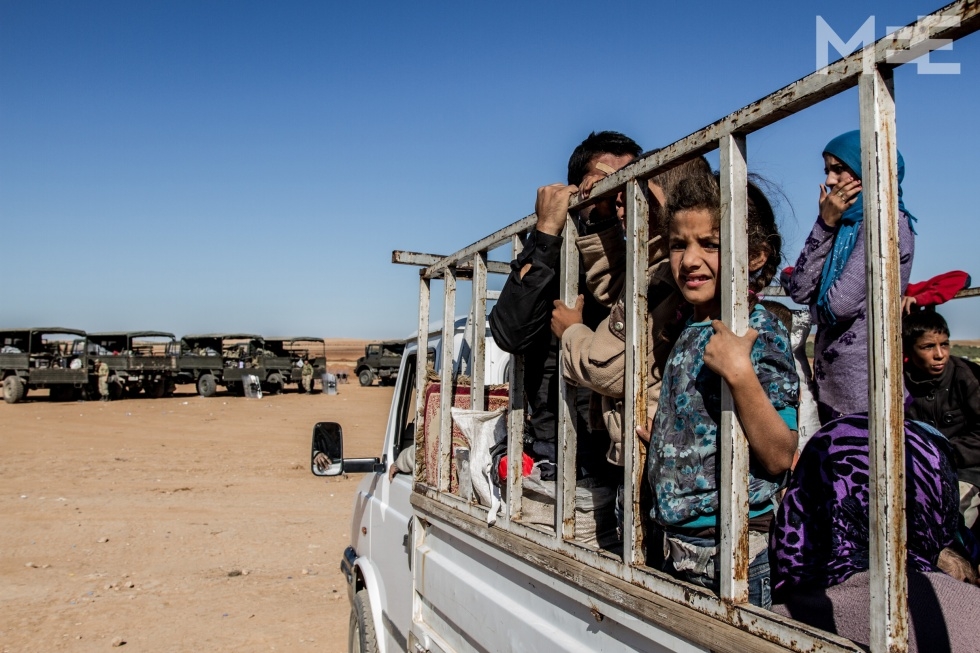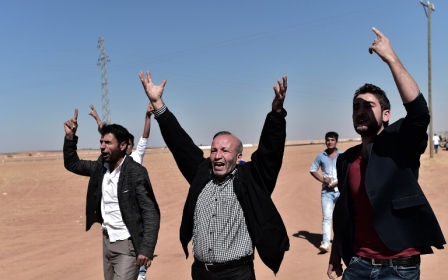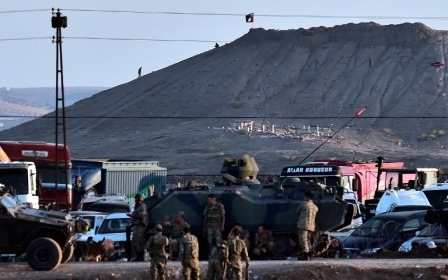Turkey will only send troops into Syria if coalition backs Assad oust: PM

In an exclusive interview with CNN International's Christiane Amanpour, the prime minister said that without the removal of Syrian President Bashar Assad, the Syrian regime's ongoing offensives posed as big a threat as that caused by the Islamic State.
"We are ready to do everything as long as there is a clear strategy that after [Islamic State] we can be sure that our borders will be protected,” he said. "We don't want the [Assad] regime on our border any more, pushing people against - towards Turkey."
"If [Islamic State] goes, another radical organisation may come in as long as Assad stays in his seat," he added.
Davutoglu emphasized the need for a comprehensive international strategy to defeat the terrorist elements threatening the entire region and displacing millions of people, especially in the last few months.
"So our approach should be ... not just to punish - to satisfy our public opinion - to punish one terrorist organisation, but to eliminate all terrorist threats in the future, and also to eliminate all brutal crimes against humanity committed by the regime," he said.
NATO has said that it would do whatever is necessary to protect member state Turkey if it came under attack. However, many NATO members - including America - have long shied away from calls to topple Assad by force, especially without a UN mandate for action, an avenue that has long been blocked by key Assad ally Russia that is widely expected to block any moves for his oust.
Turkey has been pushing for the establishment of a no-fly zone and safe haven in Syria near the Turkish border as a priority which it sees necessary if the international US-led coalition wants to join forces with Ankara against IS.
The coalition recently mounted airstrikes against the militant group in Iraq and Syria.
"We want to have a no-fly zone. We want to have a safe haven on our border. Otherwise, all these burdens will continue to go on the shoulders of Turkey and other neighboring countries," Davutoglu said.
Obama administration officials have reiterated that neither a no-fly zone nor a safe haven within Syria are currently part of the coalition's approach to defeating IS.
In Washington, State Department spokeswoman Jen Psaki said, "Our position hasn’t changed. Our focus is on [Islamic State]. We certainly are continuing to support the Syrian opposition, but I don’t have anything new on that regard."
The recent massive influx of Syrian Kurds from the border town of Kobani was one of the main underlying reasons for the two preconditions for Turkey's joining coalition forces in a possible ground operation, he said.
More than 180,000 Kurdish refugees have taken shelter in Turkey since the country opened its border 19 September, according to Davutoglu.
"Those who request something from us should understand our needs as well. This is not a one-sided relationship," he added.
The head of the Turkish government objected to concentrating on only one region in Syria or Iraq and ignoring others, stressing the need to formulate an integrated strategy to root out the militant threat in the wider Middle East.
"If there is a need of intervention in Kobani, we are saying that there is a need of intervention in all Syria, along all of our border," he said.
The Turkish parliament accepted a motion Thursday authorising military action in Syria and Iraq against any terrorist group, including IS.
The motion allows military incursions into Syria and Iraq against a threat to Turkey and allows foreign forces to use Turkish territory for possible operations against IS.
Asked whether Turkey would send in ground troops to save Kobani, Davutoglu reiterated that Turkey was ready to do whatever was necessary for Kobani, but said sending troops was another decision.
"We will do everything possible to help people of Kobani because they are our brothers and sisters. We don't see them as Kurds, Turkmens or Arabs," he said.
The Turkish premier stated that Turkey's priorities in Kobani were to save the lives of people fleeing the IS advance.
"Of course, we are now working with the coalition members on what to do next against [Islamic State] not only in Kobani," he said.
The prime minister also criticized what he described as "a lack of proper action" by Western countries regarding the rise of radicalism in Syria, against which he said Ankara had warned them "several times."
Davutoglu also responded to the recent row about allegations by the US Vice President Joe Biden regarding weapons aid to Syrian fighters, which he called "a really unfair accusation."
During an address at Harvard University last Thursday, Biden accused America’s key allies in the Middle East, including Turkey, of having financed groups like IS.
"Our allies in the region were our largest problem in Syria," Biden said, claiming that certain Middle Eastern countries had provided "hundreds of millions of dollars and tens of thousands of tons of weapons" indiscriminately to anyone who would fight against Assad, thus instigating a Sunni-Shiite conflict.
Davutoglu said, "What we expect are two things: fairness and empathy. First empathy. The US has a border with Mexico and there are two states on both sides. Is it easy to control all the border?"
In a phone call Saturday, Biden apologised to Turkish President Recep Tayyip Erdogan "for any implication" that Turkey or other allies in the region supplied or facilitated the development of IS.
New MEE newsletter: Jerusalem Dispatch
Sign up to get the latest insights and analysis on Israel-Palestine, alongside Turkey Unpacked and other MEE newsletters
Middle East Eye delivers independent and unrivalled coverage and analysis of the Middle East, North Africa and beyond. To learn more about republishing this content and the associated fees, please fill out this form. More about MEE can be found here.




